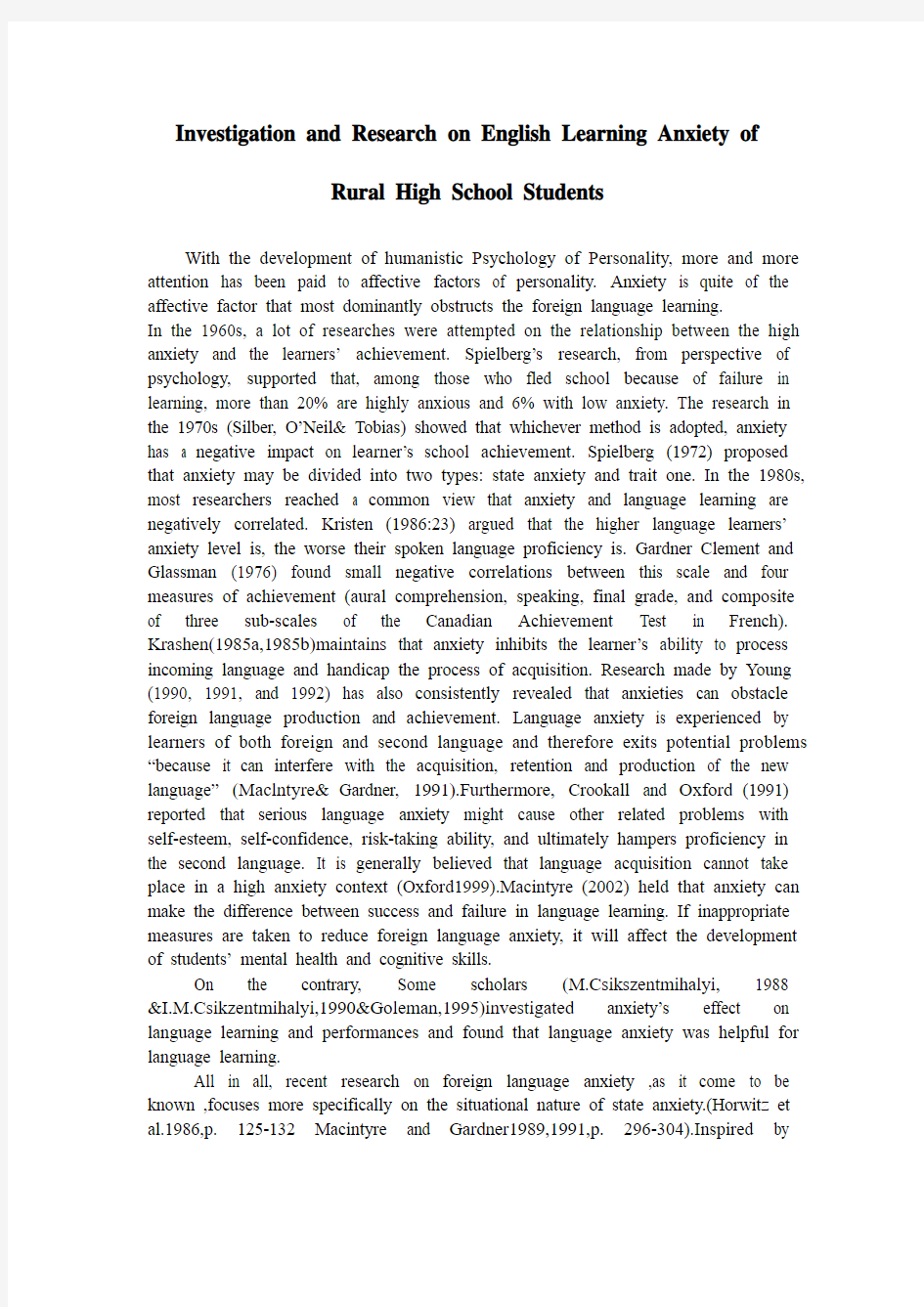外语教学科研方法与统计

- 1、下载文档前请自行甄别文档内容的完整性,平台不提供额外的编辑、内容补充、找答案等附加服务。
- 2、"仅部分预览"的文档,不可在线预览部分如存在完整性等问题,可反馈申请退款(可完整预览的文档不适用该条件!)。
- 3、如文档侵犯您的权益,请联系客服反馈,我们会尽快为您处理(人工客服工作时间:9:00-18:30)。
Investigation and Research on English Learning Anxiety of
Rural High School Students
With the development of humanistic Psychology of Personality, more and more attention has been paid to affective factors of personality. Anxiety is quite of the affective factor that most dominantly obstructs the foreign language learning.
In the 1960s, a lot of researches were attempted on the relationship between the high anxiety and the learners’ achievement. Spielberg’s research, from perspective of psychology, supported that, among those who fled school because of failure in learning, more than 20% are highly anxious and 6% with low anxiety. The research in the 1970s (Silber, O’Neil& Tobias) showed that whichever method is adopted, anxiety has a negative impact on learn er’s school achievement. Spielberg (1972) proposed that anxiety may be divided into two types: state anxiety and trait one. In the 1980s, most researchers reached a common view that anxiety and language learning are negatively correlated. Kristen (1986:23) argued that the higher language learners’ anxiety level is, the worse their spoken language proficiency is. Gardner Clement and Glassman (1976) found small negative correlations between this scale and four measures of achievement (aural comprehension, speaking, final grade, and composite of three sub-scales of the Canadian Achievement Test in French). Krashen(1985a,1985b)maintains that anxiety inhibits the learner’s ability to process incoming language and handicap the process of acquisition. Research made by Young (1990, 1991, and 1992) has also consistently revealed that anxieties can obstacle foreign language production and achievement. Language anxiety is experienced by learners of both foreign and second language and therefore exits potential problems “because it can interfere with the acquisition, retention and production of the new language” (Maclntyre&Gardner, 1991).Furthermore, Crookall and Oxford(1991) reported that serious language anxiety might cause other related problems with self-esteem, self-confidence, risk-taking ability, and ultimately hampers proficiency in the second language. It is generally believed that language acquisition cannot take place in a high anxiety context (Oxford1999).Macintyre (2002) held that anxiety can make the difference between success and failure in language learning. If inappropriate measures are taken to reduce foreign language anxiety, it will affect the development of students’ mental health and cognitive skills.
On the contrary, Some scholars (M.Csikszentmihalyi, 1988 &I.M.Csikzentmihalyi,1990&Goleman,1995)investigated anxiety’s effect on language learning and performances and found that language anxiety was helpful for language learning.
All in all, recent research on foreign language anxiety ,as it come to be known ,focuses more specifically on the situational nature of state anxiety.(Horwitz et al.1986,p. 125-132 Macintyre and Gardner1989,1991,p. 296-304).Inspired by
